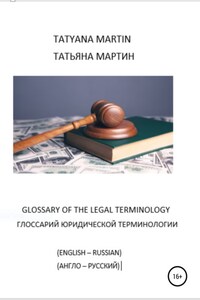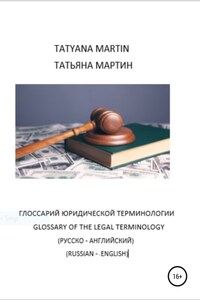The glossary of legal terminology presented to your attention contains legal terms in two languages English and Russian, and a brief description. In the glossary, the terms are presented in Latin alphabetical order. The glossary will be helpful for law-related workers, people engaged in legal literature translations, and the general public.
The glossary discusses terms in the following sections of the legal system:
1. Judicial systems and jurisdiction
2. The procedure of criminal proceedings
3. Civil litigation.
4. Stages of the trial
5. Preliminary hearing and jury trial
6. Legal ethics
7. Constitutional law
8. Crimes against the person, property, and human habitation
9. Offenses and causing harm. Intentional offenses. Murder,
10. Crimes against morality and drug abuse
11. Negligence and liability
12. Conclusion of contracts. Contract requirements. Third parties and contract execution
13. Unified Commercial Code and contracts for the sale of goods
14. Personal property and liens. Intellectual property
15. Wills. The main provisions of the will and essential reservations and instructions.
16. Disinheritance. Revocation of the will, expiration, and exceptions.
17. Absence of a will. A personal representative of the property. Agency law
18. Settlement of property status. Acquisition of ownership of the real estate. Multiple ownership of the real estate
19. Mortgage loans. Landlord and tenant
20. The procedure of marriage and divorce
21. Commercial organizations. Bankruptcy Law
22. U.S. Immigration and Naturalization Service (INS)
The difficulty of translating terms lies in different legal systems in English-speaking countries and the Russian Federation. Therefore, it is sometimes difficult to find similar legal terms in these legal systems, and some terms were described by direct translation from one language to another.
The leading legal systems in named countries are the Anglo-Saxon and Romano-Germanic legal systems. The most critical differences in the Anglo-Saxon and Romano-Germanic law systems are that the Anglo-Saxon system of law is based on judicial precedents. In contrast, the Romano-Germanic system is based on normative legal acts. Anglo-Saxon law is not divided into public and private (Anglo-Saxon law does not have a structure of clarity and systematicity, unlike the Romano-Germanic legal system).
English law is the legal system of England and most of the states of the British Commonwealth of Nations and the United States. English law can be divided into two inextricably linked branches: general (or case law) and the law of statutes – acts of Parliament.
The essence of English common law is that the courts create it. Thus, in the course of hearings, based on the principle of stare decisis ("strictly adhering to what was decided earlier"), apply legal precedents to the facts and circumstances of each particular trial. The degree of legal force of judicial decisions depends on the court's position in the hierarchy of the judicial system. The hierarchy's highest court of appeal decisions is a binding legal precedent for application by lower courts.
Statutes are a codified reflection of case law since they are sets of rules from judicial precedents. The Parliament only has to bring the process to a logical conclusion by adopting the so-called "acts on legal reforms," amending the existing statutes, and formalizing the already actively applied law norms.
In English law, the following main branches are distinguished: Constitutional Law, Administrative Law, Family Law, Tort Law, Contract Law (in Business), Property Law, Trusts, Labor Law, Evidentiary Law, Criminal Law.
English law distinguishes the following types of law: common law and the law of equity, and also public and private law. The distinction between civil and criminal liability is central to English law – the procedure for judicial protection and terminology depends on it. The critical difference between public and personal law is who triggers the mechanisms of official coercion: the state or an individual. In the field of business, private law is most applicable, especially corporate law.
Criminal law is part of public law. A private person does not pursue the criminal, but by the state, because society as a whole suffers from the crime – the scale of the harmfulness of the consequences is used to explain why the same act can entail both criminal and civil liability (for example, drunk driving with a downed pedestrian entails both criminal prosecutions for threatening the whole society with drunk driving and civil liability for harming the health of an individual). To find the defendant guilty, the public prosecutor must prove that the actions or omissions had socially dangerous consequences or that the defendant failed to fulfill the obligation to take all necessary measures to avoid criminally punishable consequences.
Civil law is an element of private law. The names of civil cases reflect the fact that a private person initiated the coercion. The plaintiff must convince the court that the veracity of his statements is more likely than improbable (the principle of greater probability). Civil liability is not a punishment but serves as compensation. Therefore, for example, debt collection in civil proceedings cannot entail restriction of the debtor's freedom (hence, in a comparative legal context, the Russian practice of prohibiting the departure of civil debtors abroad looks doubtful). The dispute may be settled out of court at the discretion of the parties. In the field of civil legal relations, the law of justice is most often applied.









